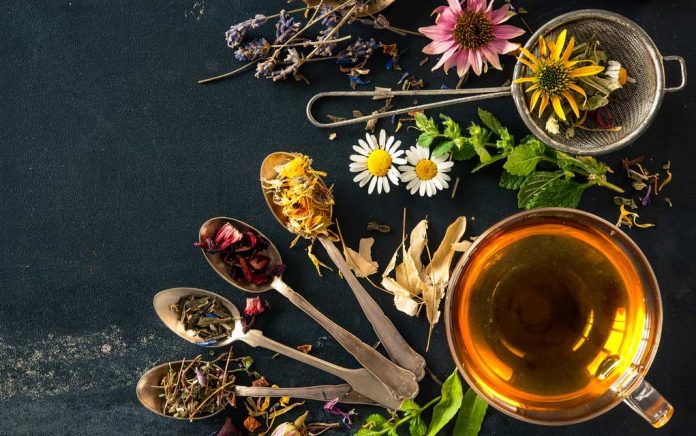(SurvivalDaily.com) – Tea is often looked at as a soothing beverage and little more. In truth, tea is full of nutrients and some have medicinal properties, making it a worthwhile staple for anyone’s diet. One of the best aspects of tea is that you don’t have to just buy it from the store; you can find plants appropriate for brewing tea just about anywhere!
Leaves That Make Teas
By definition, beverages brewed from the Asiatic tea plant are considered tea. To make marketing simple, herbs are often labeled as tea. With that in mind let’s move on to some you can find and brew on your own.
Blackberry Leaf Tea: Blackberry plants are found in abundance, especially along the border of wooded areas and sometimes even in your garden. Not only is this plant easy to find and identify, but the leaves are also packed full of Vitamin C. Although, it’s safer to consume blackberry leaf tea in small quantities due to its high tannic acid content. Liver damage can result from drinking too much of this tea
Still, this tea is considered an astringent due to the tannic acid, making it great for sore throats, ulcers, and gum inflammation. It’s best to be used medicinally or as a mouthwash. Blackberry leaf tea is useful in easing an upset stomach as well.
Nettle Tea: Ever accidentally brushed up against a plant and suddenly became very itchy? Congratulations, you may have just met the infamous nettle, also known commonly as itch-weed. Doesn’t really seem very appetizing does it? Well sometimes you have to put functionality over your comfort to survive.
The plant is nutrient-dense and contains fatty acids, along with calcium, copper, iron, phosphorus, magnesium and potassium. Symptoms of hay fever, asthma, and colds can be relieved by this tea as well.
Making nettle tea is simple; just boil young leaves that are fresh. Use caution when making this tea — wear gloves if possible. Nettles have needles all over the plant, which is what causes the itchiness. Ideally, roast the leaves over a fire to burn off the needles.
Dandelion Tea: This tea is great for your digestive tract and has anti-inflammatory properties. Dandelion tea contains antioxidants and vitamins, but perhaps its best trait is how it cleans your liver and kidneys. You can use the plant in its entirety to brew the tea too, making it super easy to consume.
Wintergreen Tea: This tea tastes and smells great, but be careful not to drink too much. Overconsumption of this tea can result in mild toxicity. However, used appropriately, wintergreen tea can have aspirin-like qualities. If you have allergic reactions to aspirin, then avoid this tea for safety’s sake. Otherwise, the tea is a great way to relieve head and body aches.
Milk Thistle Tea: This tea is known to heal liver damage and is great to drink after consuming a high tannic acid solution. Identifying the plant is easy; just look for a cobweb-like pattern on the leaves. Brewing it is just as easy as finding it, like dandelion tea, as you can use the entire plant.
Mint Tea: Mint is a great decongestant, helping in the relief effort of cold and flu symptoms. Highly nutritious, mint can be both eaten and brewed. The whole plant can be used, but the real flavor is in the leaves. Mint tea is tastes wonderful and can bring you comfort — maybe even a morale boost.
Chamomile Tea: It’s pretty safe to say that any list of teas would be incomplete if chamomile wasn’t included. Chamomile is a very popular tea because of its amazing stress-relieving properties. It naturally increases your body’s serotonin and melatonin levels, helping you feel relaxed without the drowsiness.
Chamomile tea is also full of antioxidants. It also has antimicrobial and antibacterial properties. Overall, this tea helps to boost your immune system. Stomach ache? Chamomile tea. Experiencing irritable bowel syndrome? Might we recommend chamomile tea? Nutritious and packed full of vitamin A, fatty acids, calcium, and much more.
Conclusion
There really are many herbal drinks in the world, each with their own benefit. If things go bad and there is no medicine available for you or your family, herbal and medicinal teas can be a workable substitute. Drinking tea is a good way to stay hydrated and it’s hard to get tired of it with so many options available. Just remember to be sure to use caution when drinking these teas, as some may cause extensive damage when not properly administered.
Copyright 2021, SurvivalDaily.com

















